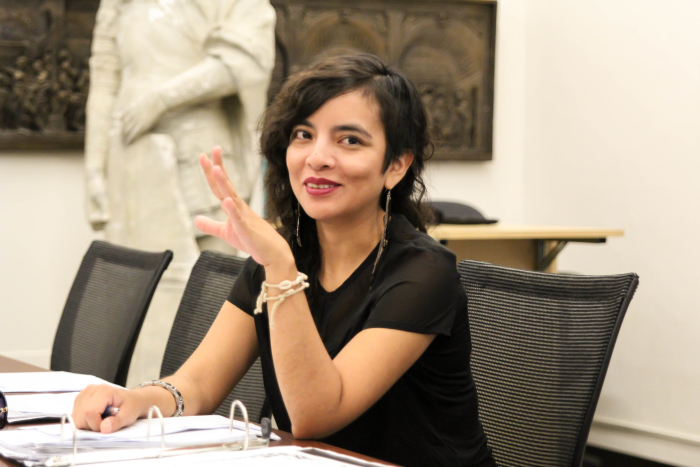Claudia Arteaga comes to Scripps College from Rutgers University in New Jersey, where she is in the process of completing her PhD in Spanish literature. She previously earned her BA in linguistics and literature from Catholic University in Lima, Peru. Arteaga’s scholarship centers on Andean studies, in particular how political and social activism is expressed by Andean indigenous people through audiovisual media. We recently interviewed her to learn more about her work and what she’ll be focusing on at Scripps.
Scripps College: What are some of the issues you explore in regard to the struggles faced by indigenous people in the Andes?
Claudia Arteaga: In my research, I explore how Andean indigenous movements have used audiovisual media to contest stereotypes and images that criminalize them and signal them as obstacles to development and modernity. Specifically, my work centers on what has been called “participatory cinema” and “indigenous media” in Andean countries such as Peru and Bolivia. My research presents some of the most significant of such initiatives that have emerged in the Andes, such as the Center for the Indigenous Cultures of Peru (Chirapaq) and the Amazonian cinema in Peru and Bolivia’s Cinematography Education and Production Center (CEFREC).
What I find interesting and extremely powerful in the films I study is that these collective initiatives challenge the way we have generally seen the relationship between the indigenous and the modern. Normally, the indigenous is placed in a no-win situation within this relationship, since modernization and its modes of representation—such as cinema—have meant assimilation and the physical and cultural death of the Indian. In contrast, the films I study reflect upon and ultimately demonstrate how being in contact with “modern technologies” need not imply the denial of ancient memories and knowledge. It is no longer “the old” being defeated by “the new.” I doubt that the colonial logic of domination has ever had the power to completely suppress the cultures it has subjugated. Knowledge denied can be retrieved, and assimilation can be undone.
SC: How do you use film and other media to provide context for the study of social justice issues impacting the Andean indigenous?
CA: The importance of studying indigenous film—not only in Andean societies but in other regions like Australia, Brazil, Mexico, New Zealand, and the U.S.—is that these films seek to have a real impact upon the localities from which they emerge. The idea is that the films act as tools, not only to expand activist networks beyond specific localities, but also to generate discussion and debate on the very issues that led indigenous activists to form the cultural organizations and movements in the first place. There is a sense of pride and cultural affirmation in these films that seek to redefine indigeneity as an identity constantly being constructed and examined “from below.” This kind of redefinition distances us from any sort of essentialism or instrumentalist construction of the Indian, so favorable to the ideologies of power.
SC: How do you want students to understand and use the bridges between academia and activism?
We know from Chicano and black scholar-activists that activism does not have to be in opposition to academia. Academia is certainly a privileged space. However, it can offer the tools and resources to potentially break down the division between theory and practice, between knowledge shaped from institutions and the impact we want to have on the real world. In this way, theory can be put into practice and theory can be created from experiences of political praxis. I think indigenous activism (and, actually, any kind of activism) teaches us that taking action also produces a type of knowledge; for it makes us question existing social and cultural ideologies and offer new ways to configure these two.
Moreover, academia can offer a space within which to build communities of knowledge, and this would not necessarily imply a retreat from activism. In order to build that knowledge, we have to be able to challenge each other’s perspectives—including my own—if we want to push critical thinking to the extreme. Ultimately, I want my students to ask themselves what they plan on doing with whatever they take away from our class discussions.
SC: Do you have a random fact about yourself that is maybe surprising, or that people don’t know about you that you’d like to share with us?
Sometimes when I say that I do indigenous studies, people assume that I am indigenous, and I am not. This is a personal fact that I address in my own work, and I have to confess that for a long time this was an issue for me. It was an issue not because I feared not having the authority to discuss indigenous matters, but because it was a constant reminder that I come from a privileged position, and that it was precisely this position that gave me the authority to talk about indigenous issues. Although some have challenged this type of authority, there is still a widespread belief that indigenous people are not the subjects, but the objects of knowledge—knowledge produced by non-indigenous thinkers who “know better.” This belief is still very true in societies like Peru, my native country. What I have learned is that the risk of recolonizing those you study is always there, so the most important thing one can do is to acknowledge that risk and work to take your analysis to the next level.
A friend of mine once told me that I would never understand the pain and suffering an indigenous person experiences since I am a “mestiza” who has lived her entire life in the capital city of Lima. This is very true, but the reason I keep studying what I study is because I also consider myself an object of examination in the most honest way possible. Decolonizing the self is a never-ending process; it requires you to move beyond your comfort zone, to be humble, and to keep learning with and from others.


